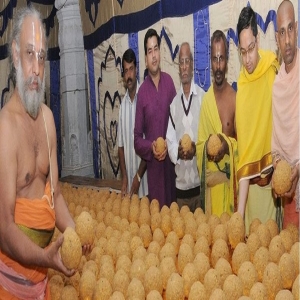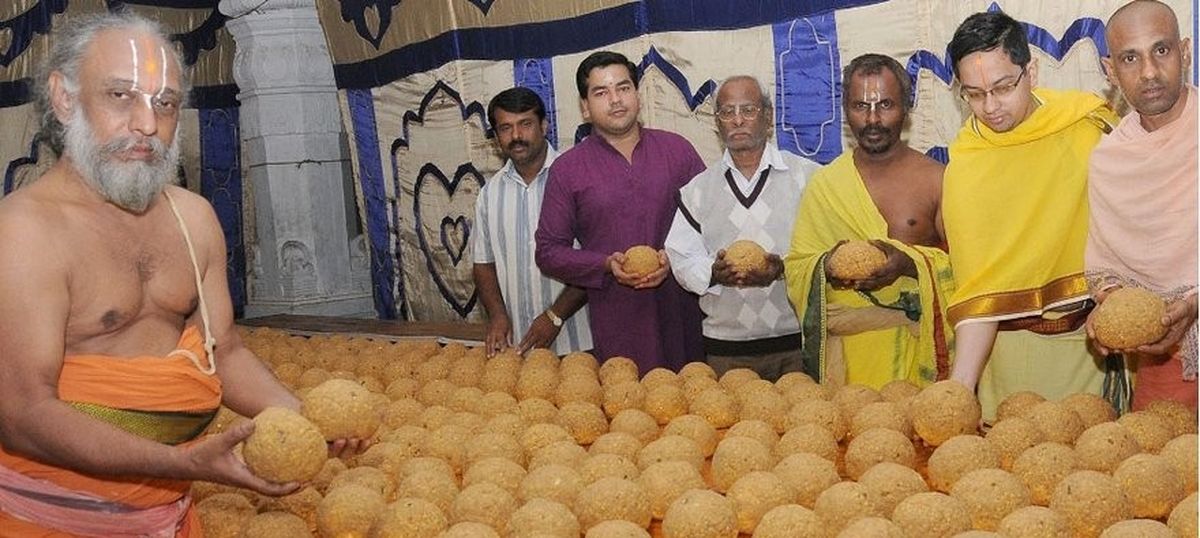
.png) M L Satyan
M L Satyan

Laddus has become a hot news topic. For all these years, the devotees at the Tirupati temple have consumed the laddus without any suspicion. Since it is a temple prasadam, there is a deep religious sentiment attached to it. That sentiment is shattered now.
Andhra Pradesh Chief Minister Chandrababu Naidu has alleged that animal fat was used to prepare the laddus at Tirumala during the previous YSR Congress Party (YSRCP) regime. Naidu told a meeting of the NDA legislature party at Amaravati on September 18, 2024, "Even Tirumala laddu was made with substandard ingredients. They used animal fat instead of ghee. The TDP-led NDA government had sanitised the process and improved the quality of the laddus."
The YSRCP rejected the allegation as "malicious". Senior YSRCP leader YV Subba Reddy, who is also a former chairman of Tirumala Tirupati Devasthanam (TTD), which runs the Sri Venkateswara Temple at Tirupati, said: "Naidu will stoop to any level for political gains. The ghee used (for the laddus) was of top quality, derived from the milk of indigenous cows of Rajasthan and Gujarat. His comments are malicious." Another former TTD chairman, Bhumana Karunakar Reddy, also rubbished Naidu's allegations. The officials involved in procuring the ghee had worked both under the previous Naidu government (2014-19) and YS Jagan Mohan Reddy's regime (2019-24), and no questions were ever raised about the quality, he said.
The famous prasadam of Lord Venkateswara is now more than 300 years old; the temple at Tirupati started offering the laddu to the Lord and as prasadam to devotees in 1715. The prasadam is prepared in a special kitchen known as Potu by laddu makers who belong to a particular sect that has been doing this work for centuries. The laddu makers have to shave their heads and wear a single clean cloth while in the kitchen.
The TTD has a state-of-the-art food testing laboratory that conducts quality checks on a laddu from each batch. Each laddu must have precise quantities of cashew, sugar, and cardamom, and the weight of the laddu should be 175 grams (the precise measurements are also a requirement for the Geographical Indication tag). "All the ingredients are brought to the kitchen only after going through stringent quality control checks at our state-of-the-art lab. There are 600 special cooks who are experts in laddu making who prepare them in two shifts. We prepare up to 3.5 lakh laddus on average daily, and up to 4 lakhs on special occasions or festivals," R Srinivasulu, the head of the Lord's kitchen, had told The Indian Express last year.
Due to this controversy, people are worried that the prasad (food offered to God and then given to devotees) might be adulterated, which means it could contain harmful or fake ingredients. This issue now has become a "wake-up call" on food safety. It is also a reminder that food adulteration is a huge problem in India, and not enough is being done to stop it. The Tirupati issue may have a political dimension. If the adulteration is true, then it is a serious breach of trust, and it shows that this problem is widespread.
According to the World Health Organisation (WHO), food adulteration is intentionally adding prohibited substances to wholly or partially replace healthy ingredients. It is the process of reducing the quality of food items by adding harmful substances or subtracting valuable things from them. Sellers do this to make more money. Today, we consume adulterated food almost all the time without realising it.
The chief reason for food adulteration is financial gain. Food businesses often add cheaper and lower quality ingredients to food products to increase their profit margin. For example, water to milk, sawdust to ground spices, or synthetic colours to fruits and vegetables are common forms of food adulteration. Another reason for food adulteration is the lack of proper ingredient regulation and enforcement of food safety standards. In many countries, food laws are weak, and food regulators are understaffed, poorly trained, or corrupt. This creates an environment where dishonest food businesses can thrive and engage in food adulteration with impunity.
Alarmingly, an estimated 60 crore people – almost 1 in 10 persons – fall ill after eating contaminated food globally, and 4.2 lakhs die every year, resulting in the loss of 3.3 crore healthy life years. Approximately 9.2 thousand crore rupees are lost each year in productivity and medical expenses resulting from unsafe food in low- and middle-income countries. Children under 5 years of age carry 40% of the foodborne disease burden, with 1.25 lakh deaths every year. Foodborne diseases impede socioeconomic development by straining healthcare systems and harming national economies, tourism and trade. (source: WHO)
Food safety, nutrition, and security are closely linked. In addition to contributing to food and nutrition security, a safe food supply also supports the national economy, trade, and tourism, stimulating sustainable development. The globalisation of food trade, a growing world population, climate change, and rapidly changing food systems impact food safety. Food safety refers to the procedures, practices, and regulations implemented to ensure food is safe for consumption. It encompasses all measures to prevent foodborne illnesses, contamination, and other hazards that may arise during food production, processing, storage, distribution, and preparation.
Food Safety and Standards Authority of India (FSSAI) is an autonomous statutory body established under the Food Safety and Standards Act, 2006 (FSS Act) and works under the banner of the Ministry of Health and Family Welfare. Does this body do its job effectively? In reality, the government does not do enough to check food and stop adulteration. Usually, when something goes wrong, there are a lot of inspections and bans for a while, but then it is forgotten eventually. Adulteration in mid-day meal programs in schools and children getting affected are reported regularly from various parts of the country. Sadly, no stringent actions are taken to punish the culprits and introduce preventive measures.